Chapter 4: Optimize Your Band Website for SEO
If SEO is important to you as a musician, then having a website for your band is arguably the most important factor. But just having one isn’t quite enough. You need to optimize it for search engines.
Before you start optimizing your website you should have a pretty good sense of what you want to accomplish with your SEO, and at least a rough strategy about how to do it. Hopefully the previous chapters of this eBook have helped you do that.
If you’re ready, and you know what needs to be done…. Let’s do it.
Key Factors for Band Website SEO
The general topic of optimizing a website for SEO is just way too big to cover in this eBook. So we’ll focus on issues that are more specific to band websites.
Before we get into details though, we’ll start by offering a broad overview and linking out to good resources for general SEO advice, so that you can do more research if you wish.
Broadly speaking, the general key factors for optimizing your band website for SEO can be broken down into the following four main groups:
1. Content Delivery
Optimizing your content delivery is about making sure your website is fast, secure, and user-friendly on all devices. That means having (among other things) fast hosting, a CDN, caching, an SSL certificate, responsive HTML and CSS, and a whole bunch of other technical stuff that only a web developer understands.
If you use Bandzoogle, we take care of these things for you. We constantly optimize the speed of Bandzoogle websites, and all of our themes are responsive.
2. Website Structure
Optimizing your website structure is about organizing and structuring your website so that search engines can easily crawl through it, access all of your content, and understand what it’s “seeing”. That means having a clear page hierarchy, linking your pages together properly, having a good HTML and XML sitemap, and so on. It also means cleaning up the very common and usually-misunderstood issue of duplicate content.
It’s mostly up to you to structure your website content for SEO, but if you use Bandzoogle we take care of some of these things for you.
3. On-Page Content
Optimizing your on-page content is about making sure the content on each page on your website is organized and descriptive. This means having clean code and plenty of well-made content, using keywords appropriately, making sure all of the content is readable by search engines, and addressing a really specific topic on each page.
You can learn more about on-page SEO here. Using Bandzoogle helps you with some of this, but it’s up to you to put great content on your pages.
4. Popularity and Links
Optimizing your popularity and links is about other people around the internet talking about you, mentioning your name or music, and linking to you. It’s also about you making sure that all of your different profiles around the web link to each other. You can get the general
idea here, but we’ll talk about this more next.
Your Band Website as Your Hub
A lot of bands don’t have their own website.
Some would say that just using Bandcamp and Bandsintown is good enough. That might work for some, but if you care about your band’s SEO, it is simply not good enough. You’re at a disadvantage if you don’t have your own website with its own domain name.
And no, pointing your domain to your Bandcamp profile is not the same thing.

We looked at many examples while preparing this eBook, and the bands that didn’t have their own well-optimized website - even established bands - had major issues with their SERPs.
For example, at the time of our research, Craig Finn (of The Hold Steady) was on a solo tour, and he didn’t have his own website for his solo project. When you searched “craig finn tour dates” you found very little information aside from Songkick and Bandsintown pages. There was no Event Carousel, and no Knowledge Panel.
He has since launched his own website but even now, at time of writing, you still don’t find a Knowledge Panel for that search term.
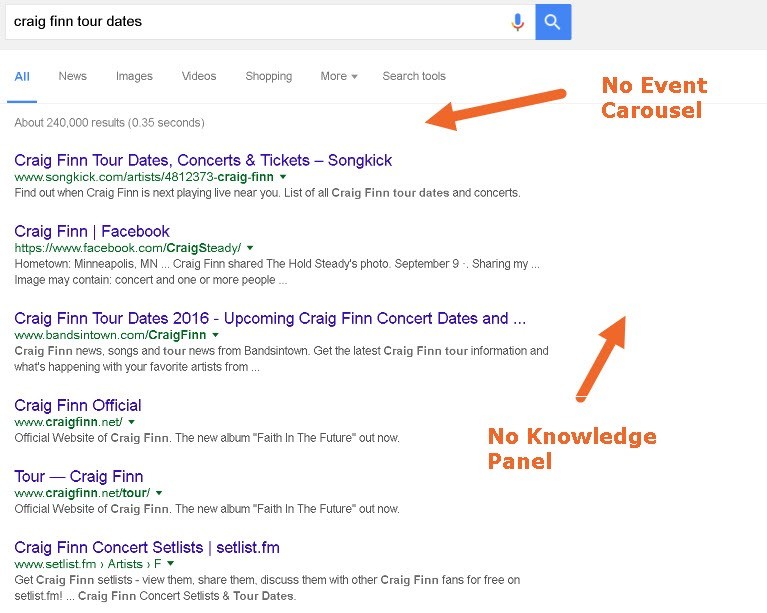
Craig Finn doesn't have good SEO because he didn't have a band website until recently.
There’s no Event Carousel here because he doesn’t currently have any upcoming tour dates. But even when he was on tour, there was no Carousel.
Which means his SEO was far from ideal during his tour.
We can assume his SEO isn’t important to him - his usual band, The Hold Steady, does have a strong online presence. But we assume you do care about your SEO, and that means you need your own website.
A major reason that your band website matters for SEO is that Google sees your band as a unique “entity,” which we touched on earlier in this eBook. Google even knows how popular/famous your band is compared to other bands and entities on the web.
Every piece of information that's publicly available about you on the internet is part of your entity. That information can be far-flung and disconnected, but Google is great at connecting the dots - especially if you help Google out by doing good SEO.
Your band entity
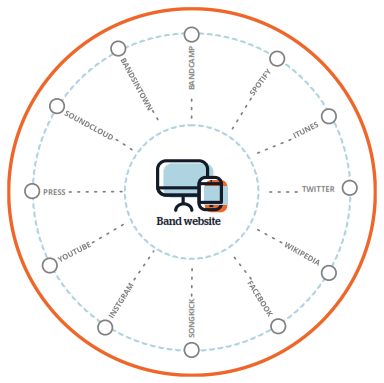
Your band entity encompasses every piece
of information available about you around the web.
When properly optimized, Google will recognize all of your profile pages and social accounts as being a part of your entity, and your website as being the hub of it all. That helps Google understand what your entity is, and show the right content to people when they search for you.

Google as a rule should give priority to your website over every other website in all cases, when it comes to ranking for your band keywords, so long as your website has all of the information it needs.
That’s the key thing. Using your band website, you can control your fan experience. Your website aggregates all of your band’s content around the web. That’s what Google likes to see.
So if you don’t have a website for your band yet stop reading right now, go make one, and then come back to continue reading.
Linking Up the Hub
Even though Google is great at connecting the dots, it still needs help. That's a big part of what SEO is.
Linking your properties together helps Google understand all of your content on the web as being part of your entity. Your website is the hub of your entity, so you need to link it up to help Google connect the dots.
Link to your website from all of your band profiles and any other content that you control anywhere on the web. Never use a URL shortener - always just the plain URL of your website.
Just like what BOYCUT did on their Facebook page here.
Easy.
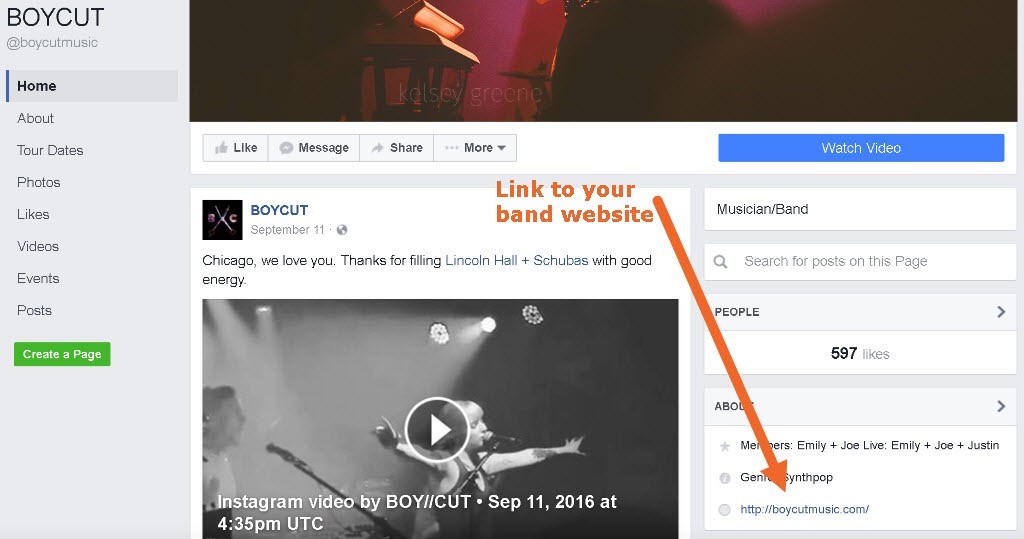
Link to your band website from everywhere you possibly can.
You can easily add links to your site from places like your:
- Facebook page
- Twitter page
- Instagram page
- YouTube channel About page
- YouTube video descriptions
- SoundCloud profile
- SoundCloud track descriptions
- Wikipedia entry
- Bandcamp page
- Bandsintown page
These are just the most common ones, but you get the picture.
So what you can do now is take an inventory of all of your band’s social profiles and other pages around the internet, and link to your band website from all of them.
You can also do the reverse. Add links from your website to your various profiles around the web.
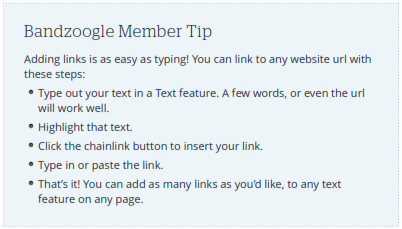
Optimizing Navigation & Indexation
Most band websites are small and don’t have many pages (compared to, say, Amazon.com). So Google shouldn’t have too much trouble accessing all of your pages. This is especially true if you use a platform like Bandzoogle, because a lot of this is already taken care of for you.
If you use another CMS like Wordpress, you’ll have to be careful because you need to know how to do a lot of things yourself.
If you want to make sure your website is well-optimized, read up on regular ol’ onsite SEO. You can learn from generic advice that applies to any kind of website.
Here are a few basics though, to ensure that Google can easily crawl through your band website and read all of your content.
Google Search Console
The Google Search Console can be very useful. If you want to nerd out on search data, you’ll especially like this.
Create a Google Search Console account for your website. You’ll need to follow some steps to verify your website and activate your account. Bandzoogle has a tool to help make this a little easier for you.
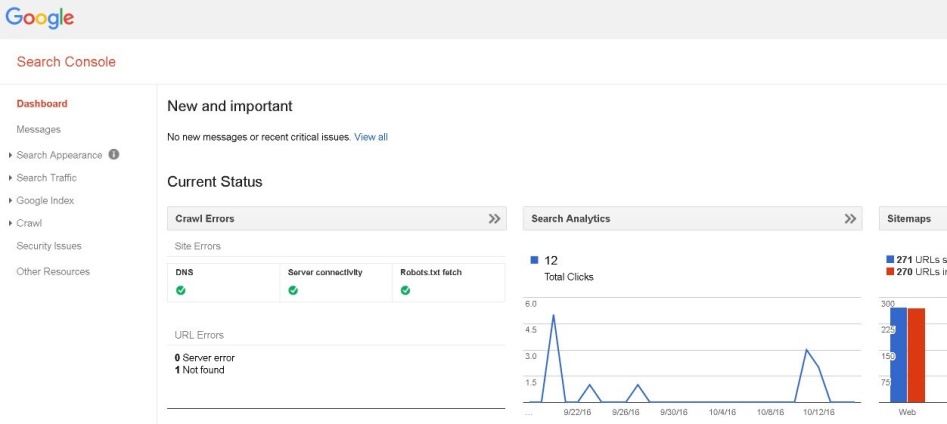
The Google Search Console can give you insights for optimizing your website.
We won’t get into details about this tool, but there is a whole bunch of information in there that Google provides about your website in the search engines. So poke around and see what’s there.
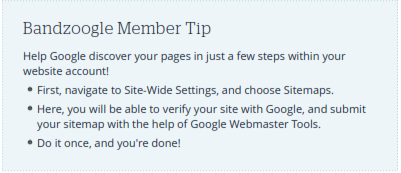
Clean URL Structure
Make sure your website page URLs are simple, clean, organized, descriptive.
Here’s a made-up example of what the URLs on a band website might look like, in an ideal scenario:
 http://hiatuskaiyote.com/press
http://hiatuskaiyote.com/press
 http://hiatuskaiyote.com/news
http://hiatuskaiyote.com/news
 http://hiatuskaiyote.com/news/create-your-own-video
http://hiatuskaiyote.com/news/create-your-own-video
 http://hiatuskaiyote.com/news/win-a-signed-vinyl
http://hiatuskaiyote.com/news/win-a-signed-vinyl
 http://hiatuskaiyote.com/shows
http://hiatuskaiyote.com/shows
 http://hiatuskaiyote.com/shows/live-at-abia
http://hiatuskaiyote.com/shows/live-at-abia
 http://hiatuskaiyote.com/shows/live-in-japan
http://hiatuskaiyote.com/shows/live-in-japan
 http://hiatuskaiyote.com/shows/house-concert
http://hiatuskaiyote.com/shows/house-concert














